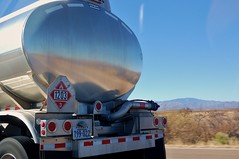 I had an interesting conversation about sustainable lifestyles on Twitter this morning.
I had an interesting conversation about sustainable lifestyles on Twitter this morning.
I believe that climate change is a major threat to our planet, and that we’re in danger of reaching a tipping point beyond which there is no return. More generally, because my personal mission statement is to have a positive impact on the world, I’m conscious that I don’t want to make an unsustainable amount of waste.
Which of course, I do. Although I try to be a good citizen – I consume locally-produced products, I take public transport rather than driving whenever possible – I’m aware of my relatively large carbon footprint. In particular, I fly a fair amount, often across large distances, I run computer servers, which by necessity are switched on all the time, and I buy electronics, which have an appalling environmental impact. (It’s sometimes easy to forget how much of an impact computing has, because it feels clean – the impacts are out of sight, out of mind. Truthiness in consumption.)
I travel less than I could, of course. A lot of my meetings happen over Google+ Hangouts or Skype, which let me see people without having to actually be in the same room with them. BART makes traveling across the bay to San Francisco simple and relatively clean (PDF link). But I do own a car, which I drive two or three times a week, and I will be flying both to XOXO in Portland, and to Austin, next month. It’s by far the cheapest way to get there.
And that’s the kicker. I could run the server that powers this website through a renewably-powered web host like AISO, for example, but I don’t. A dedicated server through a green host is simply much more expensive than through my existing host. Every financial transaction counts, particularly in the midst of a financial crisis, and I need to think about my costs.
Because flying is cheaper than taking the train – a ludicrous state of affairs – people will fly. It’s as simple as that. Making any other decision is solely the domain of people who don’t need to worry about money, and that’s not most of us. Anyone who’s run a startup knows that the bottom line is important. The key is making products and services available that don’t kill the earth, but are also economically competitive. They’ve got to be affordable. That’s the real-world requirement for most people.
A lot of our environmentally unsustainable practices are due to the economies of bulk production. My hope is that the web can help with this: because it’s now easier to connect ourselves together than ever before, and take payments through awesome services like Square, theoretically local producers can make themselves more available to local customers than ever before. There’s less of a need to ship many products – particularly food – from half a world away, or to make many things in very centralized ways. But the reality is also that, without a Stargate at our disposal, materials still need to be shipped. Everything isn’t available everywhere. That’s just how the world is. (I’m lucky that I live in California, which is a major food producer – there are a great deal more local resources than there were, for example, when I lived in Scotland.)
Technology can help in other ways. Meat is unsustainable. I’m not a vegetarian, but I’ve tried Beyond Meat, and I like it. I also like their mission, which is to create a product that is healthier and more environmentally sustainable than meat, but also cheaper. That’s smart, and is exactly the kind of pragmatic thinking that will change peoples’ lifestyles. I don’t think that people are going to be moving from chicken to reclaimed pea protein in droves, at least not immediately, but I respect that they’ve considered peoples’ real-life needs, and aren’t creating an elitist product. (And I do honestly think it’s pretty tasty.)
Ultimately, though, we’ve created a society based around production and consumption, and we’re all active participants. In fact, we love it – and that’s okay. What we can do, though, is understand that a more efficient infrastructure is also more sustainable – both economically and environmentally. Well-built public transport would lower our costs as business people, stimulate economic growth by encouraging trade, and would also lower our emissions. Better datacenters and less wasteful methods of production would reduce our costs, and also reduce the impact of the products and services we consume.
But it also requires longer-term thinking. Products that consume less electricity cost less in the long term, but might have a higher up-front price. We might pay a little more tax as a percentage to get a high-speed rail link up and running, but we will be repaid by the economic benefits. Modern distribution methods require money to install, but they eventually more than pay for themselves. We need a more efficient infrastructure to do business in the 21st century, and it just so happens that establishing that will be better for our planet – which in turn will result in fewer of the negative effects of climate change and resource depletion, and will also leave us correspondingly wealthier.
The politicians and businessmen who stand in the way of this are in it for the short-term, and are in it for themselves. It’s not just that they want to spend the money on infrastructure upgrades – they want to keep economic value locked up legacy gatekeeper structures, and prevent us from doing business on our terms. I’m not sure it’s possible to live sustainably in a digital society, but it can be, and it should be.
We’ve got to keep moving forward.
Leave a Reply